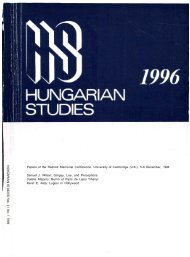The Canadian-American Review of Hungarian Studies - Vol. 4 ... - EPA
The Canadian-American Review of Hungarian Studies - Vol. 4 ... - EPA
The Canadian-American Review of Hungarian Studies - Vol. 4 ... - EPA
You also want an ePaper? Increase the reach of your titles
YUMPU automatically turns print PDFs into web optimized ePapers that Google loves.
fifteen minutes, and spent the rest <strong>of</strong> the hour versifying the translation.He found that the "metre flowed" from his pen "almost as freely asprose." 10 But this incident did not inspire a systematic effort at versetranslation. It was only during the second half <strong>of</strong> the 1920's that hebecame involved in translating European verse into English and developedintimate ties with <strong>Canadian</strong>s <strong>of</strong> European background. Kirkconnell'sfirst encounter with New <strong>Canadian</strong>s came in 1922, when on hisreturn voyage from England he found himself surrounded by immigrantsfrom many parts <strong>of</strong> Europe. Scattered throughout this largegroup, comprising mainly agricultural workers, Kirkconnell foundseveral well-educated refugees from Eastern Europe's civil wars andrevolutions. 11 He was apparently impressed and took an interest inthem but after arriving in Canada lost contact with them.In September <strong>of</strong> the same year, Kirkconnell began his teaching careerin Winnipeg. During his first three years in this busy centre <strong>of</strong> immigrantlife, the young university teacher did not develop close contactswith New <strong>Canadian</strong>s. What led to Kirkconnell's life-long friendshipwith Canada's European immigrants was involvement in verse translation.Kirkconnell turned to this type <strong>of</strong> scholarly activity for solace whenhis wife died after giving birth to twin sons. In the lonely, long monthsthat followed, Kirkconnell made plans for translating samples <strong>of</strong>Europe's best poetry into English "as a memorial" to his departedwife. 12 This was a monumental plan, beset by many difficulties, not theleast <strong>of</strong> which was the lack <strong>of</strong> suitable grammar books and dictionaries.Kirkconnell was also saddled with incredulous publishers who at firstrefused to believe that anyone could master scores <strong>of</strong> foreign languages,and translate the poetry <strong>of</strong> numerous European nations. Only afterinternationally recognized experts <strong>of</strong> European linguistics ascertainedthe quality <strong>of</strong> Kirkconnell's translations was a publisher found. Kirkconnell'sfirst volume <strong>of</strong> verse translation, European Elegies, appearedin 1928.A Philosophy <strong>of</strong> Ethnic RelationsAt first, verse translating served Kirkconnell only one purpose: ithelped to "deaden the pain <strong>of</strong> great bereavement." 13 But soon the taskassumed greater significance. As he expressed it in his memoirs: "itopened doors for me into new worlds <strong>of</strong> imaginative experience." 14 Italso launched Kirkconnell's career as a verse translator. This activitygained him new acquaintances, initially mainly among the academic
















